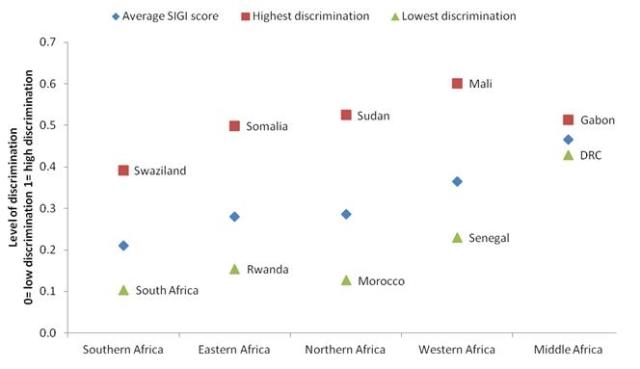There is widespread consensus that gender equality is a prerequisite for development, growth and poverty reduction. In recent decades, policy makers and researchers have increasingly turned attention and resources to closing gender gaps on key economic and social indicators, yet at the same time have grappled with questions as to why gender inequalities persist. Discriminatory social institutions – social norms, practices, formal and informal laws – have gained prominence as a useful analytical framework to illuminate what drives gender inequalities and development outcomes more broadly.

The Social Institutions and Gender Index (SIGI) is an innovative measure of underlying discrimination against women for over 100 developing countries, developed by the OECD’s Development Centre. While other indices measure gender inequalities in outcomes such as education and employment, the SIGI helps policy-makers and researchers understand what drives these outcomes. The SIGI captures and quantifies discriminatory social institutions – these include among others, early marriage, discriminatory inheritance practices, violence against women, son bias, restrictions on access to public space and restricted access to productive resources. As a composite index made up of 14 variables, SIGI and its sub-indices provide tools to compare the level of underlying discrimination against women.
The 2012 Social Institutions and Gender Index (SIGI) shows that countries have made promising progress in tackling discriminatory social institutions in some areas. For countries scored in the 2012 SIGI:
- The average prevalence of early marriage across countries has decreased to 17% in 2012 from 21% in 2009.
- The number of countries with specific legislation to combat domestic violence has more than doubled from 21 in 2009 to 53 in 2012.
- 23 out of the 35 countries where missing women was identified as a concern in 2009 have shown improvement in 2012.
- 29 countries have quotas to promote women’s political participation at both national and sub-national levels.
Despite positive steps, pervasive and persistent social institutions continue to limit women and girls’ horizons in all regions ranked in the 2012 SIGI.
- 86 out of 121 countries scored in the 2012 SIGI have discriminatory inheritance laws or practices.
- Women’s reproductive autonomy is restricted: on average, 1 in 5 women has an unmet need for family planning.
- Despite the introduction of laws, attitudes that normalise violence against women persist. On average, for the countries scored in the SIGI, around 1 in 2 women believe domestic violence is justified in certain circumstances.
- On average, women hold only 15% of land titles for countries where data is available.
Latin America and the Caribbean shows the lowest level of overall discrimination against women in the 2012 SIGI rankings. South Asia has improved its position from the lowest ranked region in 2009 to the fourth ranked region in 2012.This is largely due to the introduction of laws to combat violence against women, decline in early marriage, introduction of quotas to promote women’s political participation and improvement in son bias for some countries in the region. Sub-Saharan Africa shows the highest level of discrimination. Europe and Central Asia has moved from the top ranking region in the 2009 SIGI to the third ranked region in the 2012 edition. This is largely due to a growing problem of son bias in some parts of the region and the absence of quotas to promote women’s equal political participation.

www.genderindex.org
Composition of 2012 SIGI:
- Discriminatory Family Code: legal age of marriage, early marriage, prenatal authority, inheritance
- Restricted Physical Integrity: Violence against women (laws, attitudes and prevalence), female genital mutilation, reproductive integrity
- Son Bias: missing women, fertility preferences
- Restricted Resources and Entitlements: access to land, property, credit
- Restricted Civil Liberties: Access to public space, political voice
Policies can change discriminatory social institutions:
Top-ranking countries have addressed discriminatory social institutions by ensuring gender equality in the family, land and property rights, introducing measures to improve women’s access to credit, introducing and implementing strong laws and programmes to combat violence against women, ensuring women’s access to reproductive health services, removing restrictions on women’s access to public space and introducing laws to promote women’s political participation at a national or sub-national level. A three-pronged approach to tackling discriminatory social institutions is required.
1. Legal reform
- Harmonisation, full implementation and enforcement of laws to guarantee equality and protection from harmful practices and violence
- Provision of judicial training, legal services, awareness-raising and legal literacy programmes
2. Community mobilisation and empowerment
- Public awareness and community mobilisation activities to tackle attitudes and shift norms
- Support networks and skills development to address knowledge gaps and attitudes
3. Economic support and incentives
- Cash transfers and stipends to change practices
- Income-generating support and opportunities to remove economic constraint
Source: www.genderindex.org
Further reading: A. Luci Greulich, J. Jütting, C. Morrisson (2012): “Why do so many women end up in bad jobs? A cross country assessment for developing countries.” The European Journal of Development Research Vol 24 N°4, September 2012.

 Wikigender
Wikigender